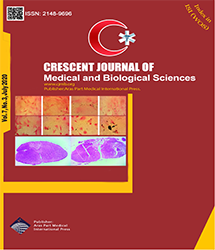
| Original Article | |
| Is Beliefs About Medication a Factor in Adherence to the Medicine in Patients Undergoing Coronary Angioplasty? | |
| Atefeh Allahbakhshian1, Rasoul Nazif Gharamaleki2, Azad Rahmani1, Faranak Jabbarzadeh Tabrizi1, Maryam Allahbakhshian3, Leila Gholizadeh4, Samad Ghafari5, Parvin Sarbakhsh6 | |
| 1Faculty of Nursing and Midwifery, Tabriz University of Medical Sciences Tabriz, Iran 2Faculty of Nursing and Midwifery, Alinasab Hospital, Tabriz University of Medical Sciences Tabriz, Iran 3Faculty of Nursing, Shahid Beheshty University of Medical Sciences, Tehran, Iran 4Faculty of Health, University of Technology, Sidney, Australia 5Faculty of Medicine, Tabriz University of Medical Sciences, Tabriz, Iran 6Faculty of Health, Tabriz University of Medical Sciences, Tabriz, Iran |
|
|
CJMB 2020; 7: 414-420 Viewed : 5015 times Downloaded : 3453 times. Keywords : Belief in medication, Medication adherence, Coronary angioplasty |
|
| Full Text(PDF) | Related Articles | |
| Abstract | |
Objectives: There are some side effects such as the restenosis of the coronary artery resulted from the failure to follow the medication regimen. Considering that patients" beliefs have a great role in their lifestyle, this study aimed at investigating the relationship between beliefs in medication and self-reported medication adherence in patients with coronary angioplasty (CA). Materials and Methods: This was a descriptive cross-sectional correlational study. Based on the inclusion criteria, qualified participants were chosen from among the patients who referred to heart specialty hospital using a convenience sampling method. The applied questionnaire in this study included three sections encompassing the demographic information, a 5-item Medication Adherence Questionnaire (MARS), and BMQ-S questionnaire containing two aspects of "necessity" and "concerns about taking medications". Results: The mean of participants" age was 56.99 (SD=12.80) and the majority of the participants were males (78.7%), married (89.3%), and mostly illiterate (30.7%). The study results showed that 70% (n=105) of the participants had a weak medication adherence. The results of the Pearson correlation demonstrated a statistically significant relationship between the beliefs in medication and adherence to it. Conclusions: After CA, nurses and family members can pave the way for the patients to adhere to medication by influencing their beliefs. |
Cite By, Google Scholar
Google Scholar
PubMed
Online Submission System
 CJMB ENDNOTE ® Style
CJMB ENDNOTE ® Style
 Tutorials
Tutorials
 Publication Charge
Medical and Biological Research Center
About Journal
Publication Charge
Medical and Biological Research Center
About Journal
Aras Part Medical International Press Editor-in-Chief
Arash Khaki
Deputy Editor
Zafer Akan


















